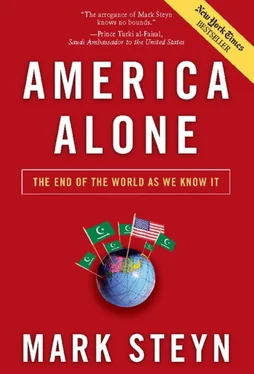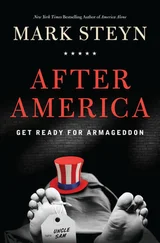You may vaguely remember seeing some flaming cars on the evening news toward the end of 2005. Something going on in France, apparently. Something to do with — what’s the word? — “youths.” When I pointed out the media’s strange reluctance to use the M-word visa-vis the rioting “youths,” I received a ton of e-mails arguing there’s no Islamist component, they’re not the madrassa crowd, they may be Muslim but they’re secular and Westernized and into drugs and rap and meaningless sex with no emotional commitment, and rioting and looting and torching and trashing, just like any normal healthy Western teenagers. These guys have economic concerns, it’s the lack of jobs, it’s conditions peculiar, to France, etc. As one correspondent wrote, “You right-wing shit-for-brains think everything’s about jihad.”
Actually, I don’t think everything’s about jihad. But I do think, as I said, that a good 90 percent of everything’s about demography. Take that media characterization of those French rioters: “youths.” What’s the salient point about youths? They’re youthful. Very few octogenarians want to go torching Renaults every night. It’s not easy lobbing a Molotov cocktail into a police station and then hobbling back with your walker across the street before the searing heat of the explosion melts your hip replacement. Civil disobedience is a young man’s game.
Now ponder that bland statistic you heard a lot in the news reports: “about 10 percent of France’s population is Muslim.” Give or take a million here, a million there, that’s a broadly correct 2005 statistic as far as it goes. But the population spread isn’t even. And when it comes to those living in France aged twenty and under, about 30 percent are said to be Muslim, and in the major urban centers, about 45 percent. If it came down to street-by-street fighting, as Michel Gurfinkiel, the editor of Valeurs Actuelles, points out, “the combatant ratio in any ethnic war may thus be one to one” — already, right now. It is not necessary, incidentally, for Islam to become a statistical majority in order to function as one. At the height of its power in the eighth century, the “Islamic world” stretched from Spain to India yet its population was only minority Muslim. Nonetheless, by 2010, more elderly white Catholic ethnic frogs will have croaked and more fit healthy Muslim youths will be hitting the streets. One day they’ll even be on the beach at St. Tropez, and if you and your infidel whore happen to be lying there wearing nothing but two coats of Ambre Solaire when they show up, you better hope that the BBC and CNN are right about there being no religioethno-cultural component to their “grievances.” In June 2006, a fifty-four-year-old Flemish train conductor called Guido Demoor got on the number 23 bus in Antwerp to go to work. Six — what’s that word again? — “youths” boarded the bus and commenced intimidating the other riders. There were some forty passengers aboard. But the “youths” were youthful and the other passengers less so. Nonetheless, Mr. Demoor asked the lads to cut it out and so they turned on him, thumping and kicking him. Of those forty other passengers, none intervened to help the man under attack. Instead, at the next stop, thirty of the forty scrammed, leaving Mr. Demoor to be beaten to death. Three “youths” were arrested, and proved to be-quelle surprise! — of Moroccan origin. The ringleader escaped and, despite police assurances of complete confidentiality, of those forty passengers only four came forward to speak to investigators. “You see what happens if you intervene,” a fellow rail worker told the Belgian newspaper De Morgen. “If Guido had not opened his mouth he would still be alive.”
No, he wouldn’t. He would be as dead as those forty passengers are, as the Belgian state is, keeping his head down, trying not to make eye contact, cowering behind his newspaper in the corner seat and hoping just to be left alone. What future in “their” country do Mr. Demoor’s two children have? My mother and grandparents came from Sint-Niklaas, a town I remember well from many childhood visits. When we stayed with great-aunts and other relatives, the upstairs floors of the row houses had no bathrooms, just chamber pots. My sister and I were left to mooch around cobbled streets with our little cousin for hours on end, wandering aimlessly past smoke-wreathed bars and cafes, occasionally buying frites with mayonnaise. With hindsight it seemed as parochially Flemish as could be imagined. Not anymore. The week before Mr. Demoor was murdered in plain sight, bus drivers in SintNiklaas walked off the job to protest the thuggery of the — here it comes again “youths.” In little more than a generation, a town has been transformed.
Of the ethnic Belgian population, some 17 percent are under eighteen years old. Of the country’s Turkish and Moroccan population, 35 percent are under eighteen years old. The “youths” get ever more numerous, the non-youths get older. To avoid the ruthless arithmetic posited by Benjamin Franklin, it is necessary for those “youths” to feel more Belgian. Is that likely? Colonel Gaddafi doesn’t think so: “There are signs that Allah will grant Islam victory in Europe — without swords, without guns, without conquests. The fifty million Muslims of Europe will turn it into a Muslim continent within a few decades.”
If the critical date for Americans in the new century is September 11, 2001, for Continentals it’s a day two and a half years later, in March 2004. On the eleventh of the month, just before Spain’s general election, a series of train bombings in Madrid killed more than two hundred people. That day, I received a ton’ of e-mails from American acquaintances along the lines of: “3/11 is Europe’s 9/11. Even the French will be in.” Friends told me: “The Europeans get it now.” Doughty warriors of the blogosphere posted the Spanish flag on their home pages in solidarity with America’s loyal allies in the war against terrorism. John Ellis, a Bush cousin and a savvy guy with a smart website, declared, “Every memberstate of the EU understands that Madrid is Rome is Berlin is Amsterdam is Paris is London is New York.”
All wrong. On Friday, March 12, hundreds of thousands of Spaniards filled Madrid’s streets and stood somberly in a bleak drizzle to mourn their dead. On Sunday, election day, the voters tossed out Jose Marla Aznar’s sadly misnamed Popular Party and handed the government to the Socialist Workers’ Party. Aznar’s party was America’s principal Continental ally in Iraq; the Socialist Workers campaigned on a pledge to withdraw Spain’s troops from Iraq. Throughout the campaign, polls showed the Popular Party cruising to victory. Then came the bomb.
Having invited people to choose between a strong horse and a weak horse, even Osama bin Laden might have been surprised to see the Spanish opt to make their general election an exercise in mass self-gelding. Within seventy-two hours of the carnage, voters sent a tough message to the terrorists: “We apologize for catching your eye.” Whether or not Madrid is Rome and Berlin and Amsterdam and Paris, it certainly isn’t New York. To be sure, there were all kinds of Kerryesque footnoted nuances to that stark election result. One sympathized with those voters reported to be angry at the government’s pathetic insistence, in the face of the emerging evidence, that the bomb attack was the work of ETA, the Basque nationalist terrorists, when it was so obviously the jihad boys. One’s sympathy, however, disappeared with their decision to vote for a party committed to disengaging from the war. And no one will remember the footnotes, the qualifications — just the final score: terrorists toppled a European government.
Читать дальше












